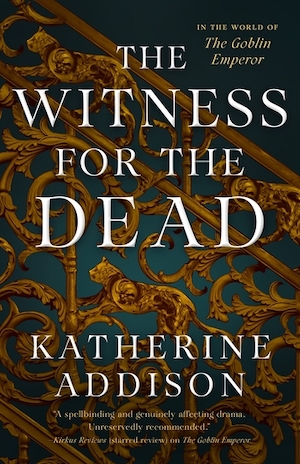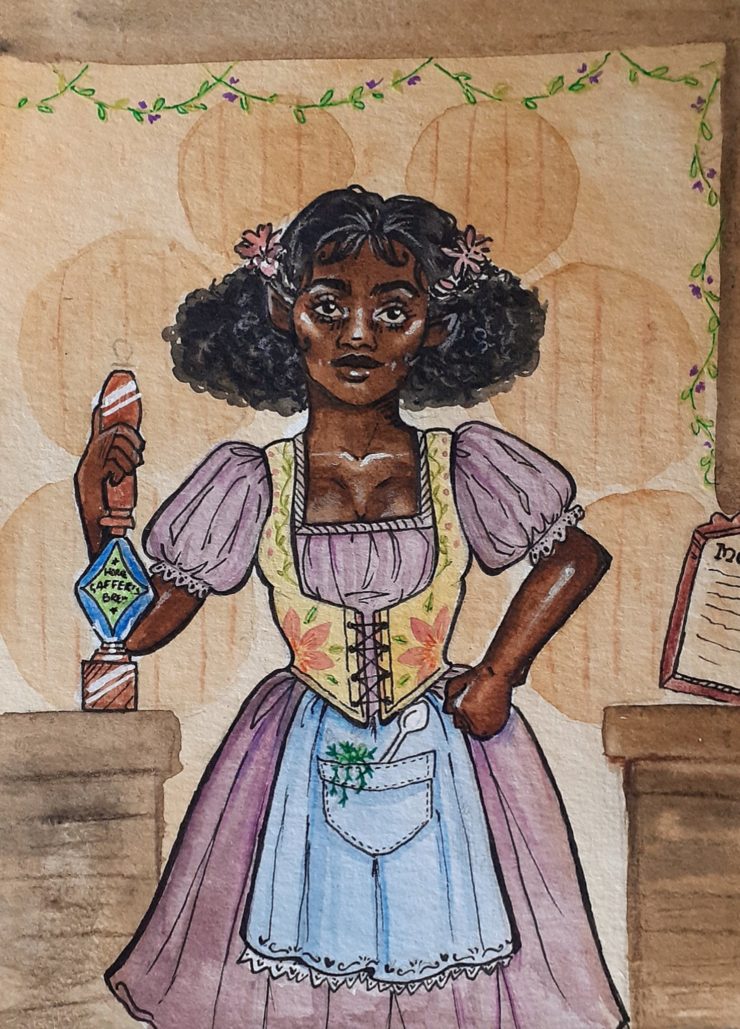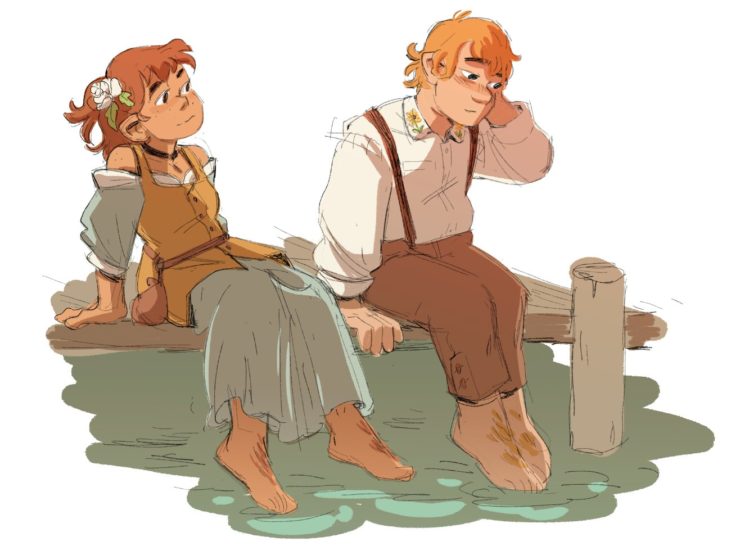In this biweekly series, we’re exploring the evolution of both major and minor figures in Tolkien’s legendarium, tracing the transformations of these characters through drafts and early manuscripts through to the finished work. This week’s installment takes a look at Rosie Cotton.
“Absolutely essential.” There are a number of characters and relationships that I’d immediately tag as “absolutely essential” to my understanding of The Lord of the Rings. Frodo and Sam’s, of course, along with that of Merry and Pippin, and perhaps at a pinch the four of them together. The Legolas—Gimli dynamic seems to me to be central to at least one of the book’s projects, and that of Aragorn and Arwen to another. Faramir’s relationship to his brother and father is important if you want to really understand his deal—though of course for the book as a whole, the most important familial dynamic might be the one between Bilbo and Frodo.
I don’t think, however, that I’ve ever really considered Sam’s relationship with Rosie Cotton to be “absolutely essential” to my reading of The Lord of the Rings. Don’t get me wrong—I love it, and I always get a warm fuzzy feeling when Sam is appropriately rewarded for his sacrifice and valor by finding his love waiting for him when he returns. But it does come at us out of the blue, you might say. Rosie isn’t even mentioned until the “Mount Doom” chapter, and there she is a mere sidenote, mentioned nostalgically alongside her brothers (honestly, the films do a far better job of building up our expectations about the potential relationship). Sam is clearly eager to see her when he returns, but Rosie—called Rose once Sam comes back and finds her as grown-up as himself—continues to be a background character, always second to Sam’s devotion to Frodo. In the drafts, Rosie didn’t even show up until Tolkien was drafting the final chapters (Sauron Defeated 108). So: “absolutely essential”? Well…I’m skeptical.
Tolkien, however, did think so. In fact, he was downright emphatic about it in a letter to a friend. He wrote:
“Since we now try to deal with ‘ordinary life’, springing up ever unquenched under the trample of world policies and events, there are love stories touched in [sic], or love in different modes, wholly absent from The Hobbit. […] I think the simple ‘rustic’ love of Sam and his Rosie (nowhere elaborated) is absolutely essential to the study of his (the chief hero’s) character, and to the theme of the relation of ordinary life (breathing, eating, working, begetting) and quests, sacrifice, causes, and the ‘longing for Elves’, and sheer beauty” (Letters 161).
Well, that’s a claim to importance if I’ve ever heard one! And such a claim deserves investigation.
First of all, it’s important that we take Tolkien’s words with a grain of salt. He has a tendency in his letters to over-dramatize both his writing process and his interpretations of his own work. We should at least remember that his descriptions of his work in his letters was nearly always inflected by the identity and beliefs of the person he was writing to. Verlyn Flieger (or, as I sometimes call her, the Queen of Tolkien Studies) has been insistent about this point: we have to be careful when we make assumptions based on anything Tolkien wrote in his letters.
Buy the Book


The Witness for the Dead
Keeping that qualification in mind, what can we say about the role of Rosie Cotton in The Lord of the Rings?
We should immediately note the similarities between Rosie and Arwen. In many ways, Sam/Rosie is a more every-day, relatable version of Aragorn/Arwen: both men are inspired by their love to do great deeds; and though neither mention their love or the women often, I would say that they are both grounded and inspired by the hope of one day building a life with the women they love.
In this context, the fact that Rosie and Sam’s love is less like a fairy-tale (than Arwen and Aragorn’s) is important. First of all, consider that for many readers, the comfortable, more “modern” world of the Hobbits is an entry-point into the higher and more epic fantasy of Middle-earth. This entry-point, or portal (because it is something of your typical “portal fantasy”), allows readers to identify with the confusion and wonder of the main cast of hobbits as they encounter people and places outside of their comfort zone: we aren’t too disoriented, in other words, because the hobbits are an anchor for our imaginations in an otherwise alien world.
Similarly, the four main hobbits (Frodo, Sam, Merry, and Pippin) all look back to the Shire as their anchor. As long as their familiar and ostensibly safe home is there to come back to, any amount of wandering is bearable, and any amount of disorientation they experience in the outside world is manageable and indeed contextualized by their strong attachment to the Shire. A sojourn in the “fantasy” world is made possible by the knowledge that the “real” world still exists and is a safe haven. “There and back again” is an essential movement of this kind of story.
This is, incidentally, why it’s so terrible when Frodo loses his memories of life at home: the effects of the Ring have severed his connection with his anchor, so to speak, and he’s adrift in chaos and the unknown. It’s also why coming back to find that Hobbiton has been overrun by the outside world is, in Sam’s words, “worse than Mordor” (LotR 1018).
Now, back to Rosie. Rosie is an important part of the equation because she plays the role of anchor for both Sam and then for us, as readers. Seeing Sam and Rosie’s love helps us to understand and believe in the idealized “fantasy” love of Aragorn and Arwen. Indeed, it makes it possible.

That is how I interpret Tolkien’s claim that Rose and Sam’s love is “absolutely essential” if we want to understand “the relation of ordinary life (breathing, eating, working, begetting) and quests, sacrifice, causes, and the ‘longing for Elves’, and sheer beauty” (Letters 161). Ordinary life is the starting point of The Lord of the Rings, and it is only by understanding it quite well, only by feeling at home in it, that we can begin to comprehend the wild grandeur of what lies beyond it.
That very idea is, in fact, a foundation point of Tolkien’s understanding of fantasy. In his famous essay “On Fairy-Stories,” he writes that “The keener and the clearer is the reason, the better fantasy it will make. […] For creative Fantasy is founded upon the hard recognition that things are so in the world as it appears under the sun; on a recognition of fact, but not a slavery to it” (The Monsters and the Critics and Other Essays 144). In other words, for Tolkien, “there” can’t exist properly unless you also have a “back again.”
Sam’s final words to Rosie, which are also the final words in the main text of The Lord of the Rings, take on special significance in this context. When Sam says “Well, I’m back,” we know that he understands just how important the “there and back again” movement is—and we simultaneously experience it as we put down the book with a sigh of mingled satisfaction and regret and return to our own “real world.”
I would argue that Sam also understands and cherishes his relationship with Rosie all the more for having seen its mirror in Arwen and Aragorn. In other words, Rosie is not just the anchor for Sam’s journey: she herself is transformed by it. She and her love are all the more miraculous to Sam—and to us—because they are touched by the light and influence of a world beyond home.
In a way, this post has been more about the power of fantasy to beautify the real world than it has been about Rosie Cotton. So let me say this: Rosie herself, despite being given very little time in the actual narrative, is crucial, both to our understanding of Tolkien’s theory of fantasy and to our experience of The Lord of the Rings—“absolutely essential,” in fact. She is not Sam’s reward for a job well done. Rosie is a sacred character: a witness to the transformative power of stories and of imagination; she teaches us that coming “back again” is to be treasured and celebrated all the more because it is the real-life embodiment of the greatest and best of our imaginations. The real world simultaneously inspires and is beautified by our flights in fantasy. And I don’t think we could properly understand this without Rosie to show us.
I’ll end with this: The real world often disappoints us. It is often ugly, cruel, and crushing. Real life is often hard, and perhaps we feel like Frodo, isolated and cut off from the things and people who would comfort us. In times like these, Rosie Cotton is an important reminder that all the good and all the beauty in Middle-earth starts here: in the real world. All we need to do is pay attention.
Megan N. Fontenot is a dedicated Tolkien scholar and fan who is once again amazed by the richness of Tolkien’s imagination. Catch her on Twitter @MeganNFontenot1 and feel free to request a favorite character while you’re there!










